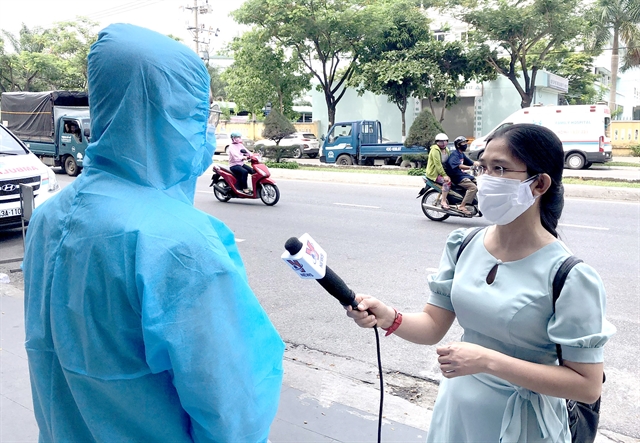 Society
Society

 |
| A female reporter for Vietnam News Agency Television at work during the COVID-19 pandemic. VNA/VNS Photo Quốc Dũng |
Khánh Dương
HÀ NỘI — During many years working as a reporter and now an editor, Trần Hoàng Lan, head of the Family News Desk of Phụ Nữ Thủ Đô (Capital City’s Women Newspaper), has found that not only women but also men feel shy about sharing gender stories and do not want to be part of conversations with journalists.
Due to gender-based stereotypes, women do not dare to share about violence. Even female journalists find it difficult to approach women, Lan said.
Sharing at a recent press talk on gender and news on the occasion of Vietnamese Women’s Day, Lan said that even female journalists working at a gender-focused newspaper like Phụ Nữ Thủ Đô face lots of obstacles in covering gender issues.
As one of two newspapers of the Việt Nam Women's Union, Phụ Nữ Thủ Đô newspaper faces the stereotype that the newspaper is for women only or covers strictly women-related issues.
When female reporters interview others about broader topics like education or transport, many interviewees show surprise that women are concerned about and write about those issues.
“When we visit remote areas, local people are surprised to see that female journalists travel that far. They think female reporters only sit in front of a desk,” Lan said.
"Many men think that the women’s newspaper is only for women to read so they feel hesitant to share with reporters. In fact, gender equality requires the sharing of both genders. Without a joining of hands from both men and women, we cannot achieve gender equality", she said.
According to statistics of Phụ Nữ Thủ Đô newspaper, the number of male readers has recently increased, but not much. Many gender equality issues have not touched men.
Lan proposed changing public stereotypes on the newspaper of women itself, raising public awareness of both men and women so women are more confident and men are no longer hesitant in sharing gender stories.
Sharing international perspectives on gender sensitive issue reporting, Associate Professor Minelle Mahtani from the Institute for Social Justice at the University of British Columbia, Canada, said “One of the things we discovered is it's impossible to get men involved in conversation of gender-based violence if they have no personal connection with it.”
She recommended reporters start thinking about the siblings, brothers and sons, people directly impacted by gender-based violence, because of their connection with the person who experienced the violence personally.
"They have their own experiences to talk about and they have their own stories to tell. By bringing them on board as part of our project, it opens up all sorts of different spaces for other men to want to be part of the conversation", she said.
Trần Lệ Thùy, director of the Centre for Media and Development Initiatives, said media jobs have opened up more opportunities for women than in the past.
Female journalists have more chances to show their abilities. If they are active and eager to learn, they have lots of opportunities to be promoted.
“However, there still persists gender stereotype in our mind, though sometimes we don’t realise it. This stereotype is the obstacle hindering the development ability of women in general not only those in media.” Thùy said
Gender stereotype affects not only job promotion but also the content of articles whose writers have not been trained about gender sensitivity, she said.
She hoped that female journalists will have more opportunities to gain more formal training with gender-related guidance to better perform their work. — VNS